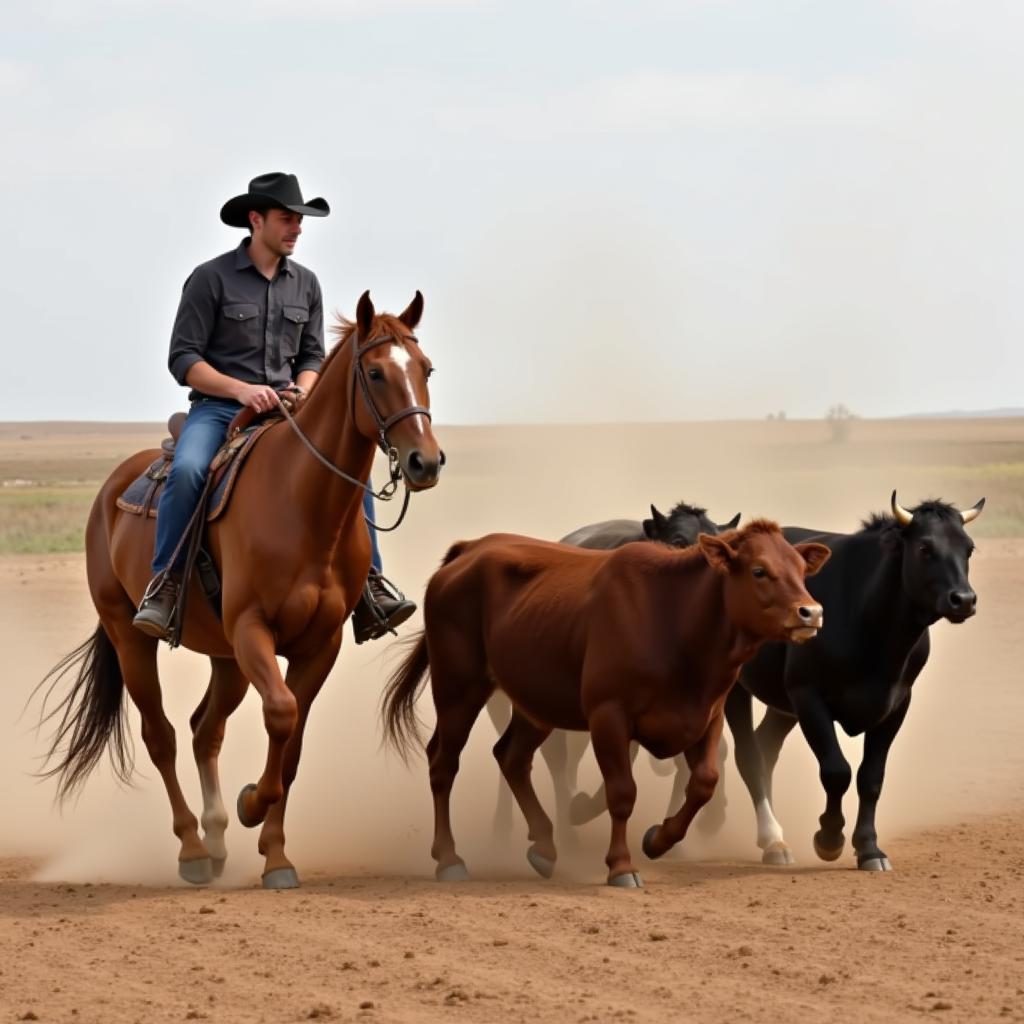The Quartz Horse, a truly all-around breed, has captivated horse lovers for generations. From their versatile athleticism to their gentle temperament, these horses have earned a well-deserved place in the hearts of riders and ranchers alike. Let’s delve into the fascinating world of the Quartz Horse, exploring its history, characteristics, and care requirements.
A Deep Dive into the Quartz Horse’s History
The history of the Quartz Horse is deeply intertwined with the development of America itself. Originating in the 17th century, these horses were bred from a mix of English Thoroughbreds and native Chickasaw horses. They gained their name from their exceptional speed over quarter-mile races, quickly becoming renowned for their sprinting prowess. Over time, their versatility became apparent, making them invaluable on ranches for herding cattle and performing various tasks. Their calm temperament, intelligence, and “cow sense” cemented their status as a quintessential working horse.
 Quarter Horse working cattle
Quarter Horse working cattle
The Versatility of the Quartz Horse: Beyond the Ranch
While their origins lie in racing and ranch work, Quartz Horses have proven their adaptability in numerous disciplines. You’ll find them excelling in everything from cutting and reining to barrel racing, rodeo events, and even English riding disciplines like dressage and jumping. This adaptability makes them a popular choice for both experienced riders and beginners.
Caring for Your Quartz Horse: Essential Tips
Just like any other breed, the Quartz Horse thrives under proper care and management. Here are some key aspects to consider when owning a Quartz Horse:
- Nutrition: A balanced diet is crucial for maintaining their energy levels and overall health. Consult with a veterinarian or equine nutritionist to develop a feeding plan tailored to your horse’s individual needs.
- Housing: Providing adequate shelter and space is essential. Quartz Horses are adaptable and can thrive in various climates, but they need protection from extreme weather conditions.
- Exercise: Regular exercise is vital to their physical and mental well-being. This can include riding, turnout time in a pasture, or other forms of physical activity.
- Healthcare: Routine veterinary checkups, vaccinations, and dental care are essential for preventing and addressing potential health issues. Regular hoof trimming and shoeing are also necessary for maintaining sound feet.
Grooming Your Quartz Horse: A Bond-Building Experience
Grooming isn’t just about keeping your horse looking its best; it’s an opportunity to build a strong bond and assess their overall health. Regular grooming sessions allow you to detect any injuries or skin conditions early on.
Quartz Horse Temperament and Training
Known for their gentle and willing nature, Quartz Horses are generally easy to train. Their intelligence and eagerness to please make them receptive to various training methods. However, like any horse, they require consistent and patient handling.
Choosing the Right Quartz Horse for You
When selecting a Quartz Horse, consider your riding experience and intended use. Whether you’re a seasoned competitor or a recreational rider, there’s a Quartz Horse out there that’s perfect for you.
“The Quartz Horse is truly an exceptional breed. Their versatility, athleticism, and gentle nature make them a joy to own and ride,” says Dr. Emily Carter, an equine veterinarian with over 20 years of experience.
 Quarter Horse and rider bond
Quarter Horse and rider bond
Conclusion: The Enduring Legacy of the Quartz Horse
The Quartz Horse, with its rich history and remarkable versatility, continues to be a beloved breed worldwide. From their humble beginnings on American ranches to their presence in various disciplines, these horses have proven their worth time and again. Their gentle nature, intelligence, and athleticism make them a true all-around horse, ensuring their enduring legacy in the equine world.
FAQs
- What is the average lifespan of a Quartz Horse? Typically, a Quartz Horse lives between 25-30 years.
- Are Quartz Horses good for beginners? Their calm temperament often makes them suitable for beginners, but proper training and guidance are still essential.
- What are the most common colors of Quartz Horses? Sorrel, chestnut, bay, black, and dun are among the most common colors.
- How much does a Quartz Horse cost? The price varies depending on age, training, and lineage, but can range from a few thousand dollars to tens of thousands.
- What are some common health concerns in Quartz Horses? Like many breeds, they can be prone to certain conditions like HYPP (Hyperkalemic Periodic Paralysis) and PSSM (Polysaccharide Storage Myopathy).
Need help with your horse or other pets? Contact us at Phone: 0772127271, Email: [email protected] or visit us at QGM2+WX2, Vị Trung, Vị Thuỷ, Hậu Giang, Vietnam. Our customer service team is available 24/7.